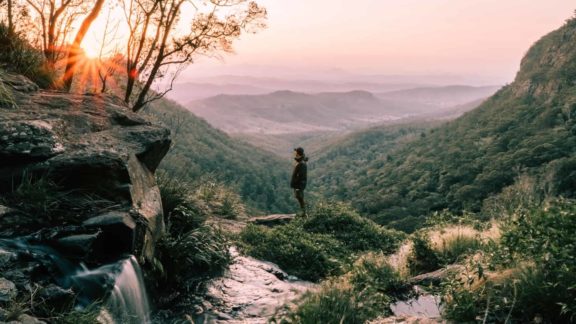If there was an Aussie gene, it might just be wanderlust.
Australians are known for their adventurous spirit and strong, innate desire to travel and explore. In fact, overseas travel by Aussies was at a record high in the period 2018-2019 with $65.5 billion spent on 11.2 million trips. That shows just how keen we are to get out there and explore!
But then the Covid-19 pandemic came along and scuppered our travel plans as well as those of the many international tourists who flock to Australia every year. It has been a massive blow to the travel and hospitality industry, but amid all the doom and gloom, some experts do see potential for a domestic-led recovery.
Australians have actually always been good about ‘wandering out yonder’ with over 90% of total trips being domestic ones. And, according to Tourism Research Australia, domestic travellers actually outspend international visitors (of which there were nine million in 2019) by a ratio of 2:1. But with foreign shores off the menu for a while at least, our only option is to look local.
Let’s look at why a domestic-led recovery may be possible.
In a recent KPMG survey, 61% of respondents said they were planning on booking a holiday between January and June 2021, with 72% planning to book one between July and December. The report also found that many Australians had both the financial means to travel as well as the time through their accrued leave and by virtue of the new way of working remotely.
Researchers believed that these and other changes in consumer behaviour could provide a much-needed boost for the travel industry.
The KPMG report highlighted three key areas which could drive recreational travel over the next year or two.
Historically, many Aussies headed for distant shores in their youth, putting off domestic travel until after they’d started their families or even retired. Now, younger Australians may start to tick off their backyard bucket list earlier than they would normally done have because pandemic restrictions mean they’re unable to travel internationally.
The Covid crisis also forced many workplaces to reinvent how they operate. Technology has enabled many people to work from home and many organisations have continued to operate effectively with a remote workforce. These more flexible working arrangements could mean that people are able to become digital nomads without having to take leave or travel over weekends and public holidays.
The third aspect that could drive domestic travel was identified as the ‘great Aussie road trip.’ Given that the majority of any increase in domestic travel will come from people taking holidays that are shorter, more frequent and more affordable, road travel is likely to be the mode of choice. Researchers surmised that the profile of travellers ‘romancing with the great Aussie road trip’ may include more young professionals, cruise enthusiasts, older families as well as backpackers who traditionally would have been undertaking trips which required their passports!
Short trips – also sometimes known as hyper-local travel – could also become the norm as the country emerges from a protracted period of uncertainty around restrictions and border closures. People will be keen to get out and do something, but they’ll probably do day-trips like taking a drive out of the city for a hike or to visit a winery or country restaurant etc. Their confidence will then build and they’ll start booking longer journeys and explore further afield.
We’re clearly a nation that loves to explore, but the vastly different Covid-19 landscape has forced people to change their minds – and their plans. People are re-evaluating why they travel, where they’re prepared to go and what they hope to gain from that experience.
Western Australia appears to have fared better than other states because of its remote location and hard borders and many people have seized the opportunity to explore their own backyard. Rottnest Island has remained one of the state’s most popular destinations during the pandemic and its close proximity to Perth means people can take spontaneous day-trips, have a ‘working’ week away from their home office or tick off a bucket list item like skydiving. Perth skydiving operators, Skydive Geronimo, said that interest in their adrenalin-fuelled experiences has remained consistently high over the pandemic which is testimony to the Aussies indomitable spirit of adventure.
The future is always unknown and Covid-19 has added a whole new dimension to that uncertainty, but we do know for sure that Aussies are resolute and nothing will dampen our thirst for travel and adventure. Even in the face of the pandemic, Australians are getting out there, exploring and discovering their own amazing backyard and confirming what they always knew – that this is truly the lucky country.
Author: Skydive Geronimo offers beach tandem skydiving on Rottnest Island, Western Australia. Their team of dedicated and experienced staff provide outstanding tandem skydive experiences where first timers and daredevils alike have the opportunity to skydive from 15,000-feet at Australia’s most picturesque drop zone.



